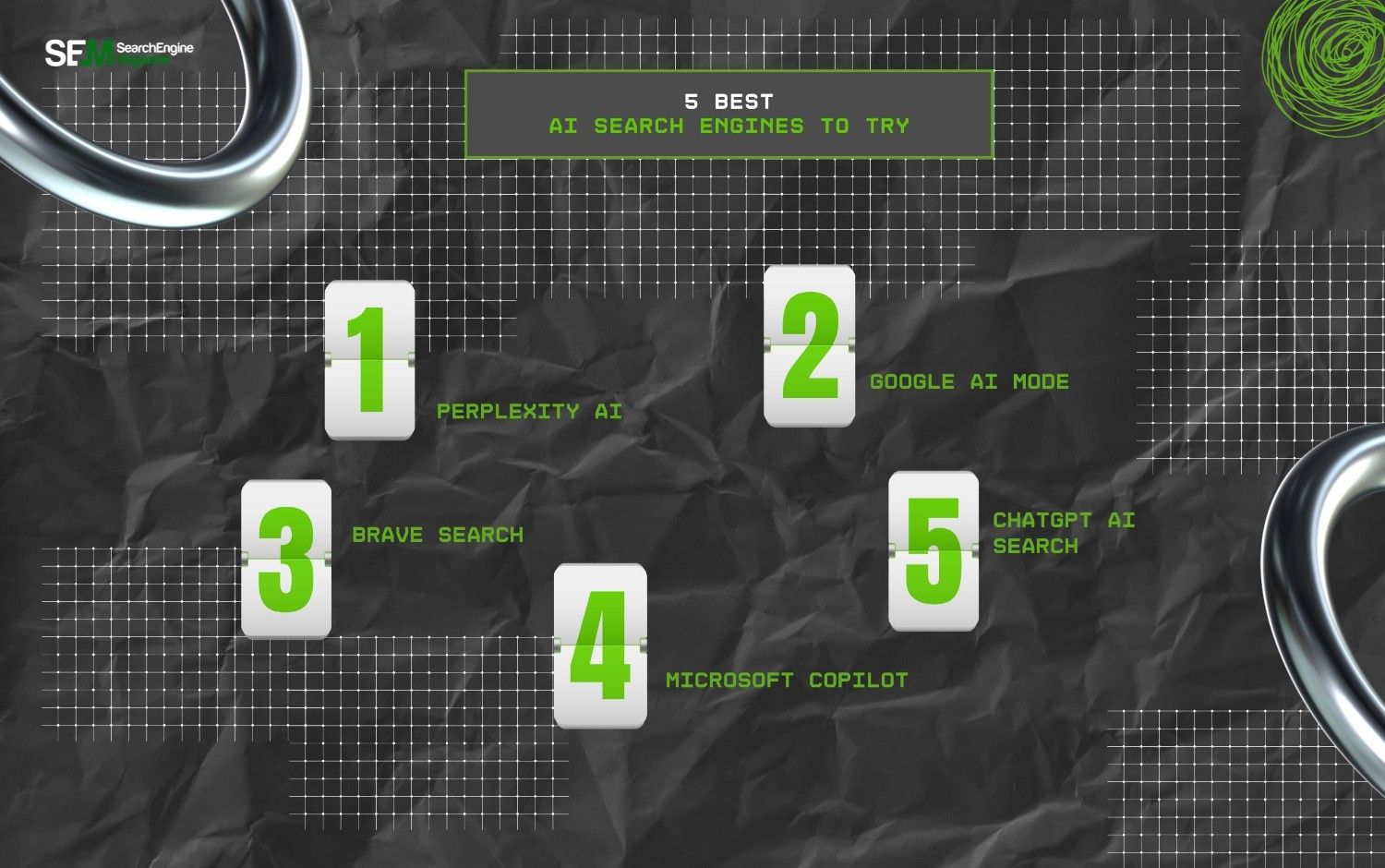GRC Considerations For Search Platforms And Digital Advertisers
Feb 24, 2026

Feb 24, 2026

Feb 24, 2026

Feb 23, 2026

Feb 23, 2026

Feb 21, 2026

Feb 20, 2026

Feb 20, 2026

Feb 19, 2026
Sorry, but nothing matched your search "". Please try again with some different keywords.


Whenever we talk about search engines, Google is the first thing that pops into our minds. And that’s natural. Google has been a dominating search engine for decades.
But, not anymore. With the emergence of AI technology, the search behavior of users has massively evolved. Now, they are seeking direct answers over scrolling through ranking articles.
So, naturally, AI-driven search engines are becoming more popular.
Unlike traditional search engines, AI models provide succinct, intuitive, and contextual results for search queries. So, users can find the exact answer that they are looking for.
But with countless AI search engines in the market, it can be confusing to choose one. Moreover, most of them lack accuracy and credibility in providing results.
So, if you are also wondering, “Which is the best AI search engine?” I have got you covered.
In this blog, I am going to explore the 5 major AI-driven search engines that you can rely on. From exploring—
Stay tuned!

Similar to traditional search engines, AI search engines function as digital search tools that allow users to search for their queries.
But they use machine learning, natural language processing, and AI technology to provide results for user queries.
That is, they understand the user intent and interpret the context to provide accurate, intuitive, and conversational responses over a list of relevant articles. So, users get direct answers to their queries.
Moreover, these responses are personalized and sourced from multiple relevant internet resources. So, addressing user queries with a summarized response from the internet.
If you are looking for an efficient AI search engine, here are a few things to check before choosing one—

Out of the many AI search engines currently popping up on the internet, here are the most popular and efficient ones. So, try them out to get accurate responses for your searches.
Firstly, Perplexity AI is by far the most popular choice for its transparent sources, speedy and accurate responses, and interactive results in real-time. So, it interprets the user intent and directly addresses the context.
In addition to this, it is a conversational search engine with detailed responses. So, users get a complete contextual result for multiple topics covering diverse industries.
Moreover, it offers both free and paid plans— $20 per month or $200 per year— with access to unlimited search features. So, based on their needs, users can choose the plan.
Unlike the traditional Google searches, its AI Mode prioritizes AI-generated responses over ranking links. Making a better version of the AI Overviews.
So, by blending Gemini’s AI technology with Google’s Knowledge Graph, it provides comprehensive search responses to the users.
In addition to this, it handles multiple queries at the same time and provides accurate and relevant responses quickly. Moreover, it is completely free. So, anyone can use it over Google searches.
Specifically designed for privacy-focused users, Brave Search uses independent search indexing along with AI technology to provide ad-free and tracker-free responses.
In addition to this, its independent search indexing helps provide unbiased results. But the feature lacks in-depth analysis of complex topics and technical queries.
Moreover, it offers both free and paid plans for $3 per month, which include advanced search features and Leo chatbot processing. So, based on one’s needs, they can choose the plan.
Compared to the other independent search engines, Microsoft Copilot is an integrated search tool within the ecosystem of Microsoft. So, it helps users to combine its features with other Microsoft tools.
Moreover, it uses the GPT-5 model of OpenAI to provide conversational responses to search queries. So, its results are intuitive, directly addressing the queries, and simple to understand.
In addition to this, it provides credible source links for the responses. So, making it a trustworthy search engine.
Also, it offers free as well as paid plans that start from $20 per month, covering all tools under Microsoft 365. So, users can easily use diverse features along with the search tool.
Finally, ending the list with the extended feature of ChatGPT— ChatGPT Search. It offers real-time responses from web results by curating the results in a conversational interface.
In addition to this, it provides fast and credible source-linked responses. So, naturally, users find it engaging and intuitive. Moreover, it allows voice searches, which makes it an incredible model for searching web results.
Also, it has both free and paid options— $20 per month to $600 per year— offering different versions. So, users can choose the version based on their budget and needs.

According to the Reddit review, Perplexity is the most popularly used AI search engine—
“The strength of Perplexity in comparison to other LLMs is in it’s position as a search tool. So everything you can use Google for, try using perplexity and provide additional context. With the personalized context, Perplexity will likely give you a better search result and the information that you need”.
Similarly, another Reddit user comments—
“I will actually say, Perplexity is a good tool for you. If you get access to Perplexity Pro, it gives you access to a lot of the more expensive models in one place, and it’s grounded with search automatically, so it’s the perfect use case for someone who will only use it occasionally”.
Another Reddit user analyzed popular AI search engines to comment—
“On average, Perplexity gives 5.01 links per answer — right in the middle compared to other tools. For context:
What surprised me was that Perplexity almost always gives 5 links. This shows it has a very consistent strategy for referencing information — unlike the more random approach used by other tools. Most URLs Perplexity links do get organic traffic from Google, but many have low traffic. That means Perplexity mixes popular and niche sources, possibly focusing more on relevance than SEO authority.”
Having AI technology in the digital front has massively impacted search habits, which has led to the transformation from traditional to AI search engines in 2025.
Moreover, AI models provide direct and real-time responses, which helps users to save time in researching and being more productive. So, they are becoming the core attraction for netizens.
But it still lacks the depth of traditional search engines on complex and highly technical subjects. So, exploring the broader topics from the responses might be a tad bit challenging.
However, with growing technical advancements, AI models will soon pick up the pace and overcome these limitations. Until then, choose one of these best AI search engines to find the exact answer to your queries.
Traditional search engines and AI search engines come with different functionalities, offering different kinds of results. So, it is hard to claim one is better than the other. Moreover, both have certain benefits and limitations. But with the changing search dynamics, AI search models are gaining popularity over the traditional ones for their real-time, intuitive, accurate, and direct responses over ranking links.
Among the many AI search engines, Perplexity offers the most accurate and reliable responses to search queries. Moreover, it provides source links next to the response for fact-checking and credibility.
Generally, most of the AI search engines are not designed with privacy-focused algorithms. But some of them like— Brave Search, Komo AI, and Arc— provide privacy-focused responses for user queries. So, they have specific policies for ads, website trackers, and user data collection.
Read Also:
Barsha is a seasoned digital marketing writer with a focus on SEO, content marketing, and conversion-driven copy. With 8+ years of experience in crafting high-performing content for startups, agencies, and established brands, Barsha brings strategic insight and storytelling together to drive online growth. When not writing, Barsha spends time obsessing over conspiracy theories, the latest Google algorithm changes, and content trends.
View all Posts
GRC Considerations For Search Platforms And D...
Feb 24, 2026
What Is Reputation Management SEO? Real-World...
Feb 24, 2026
What Is Reverse Video Search? 5 Most Effectiv...
Feb 23, 2026
10 Effective SEO Shortcuts That Actually Work
Feb 23, 2026
Business Benefits Of Sustainability: Why Corp...
Feb 21, 2026

